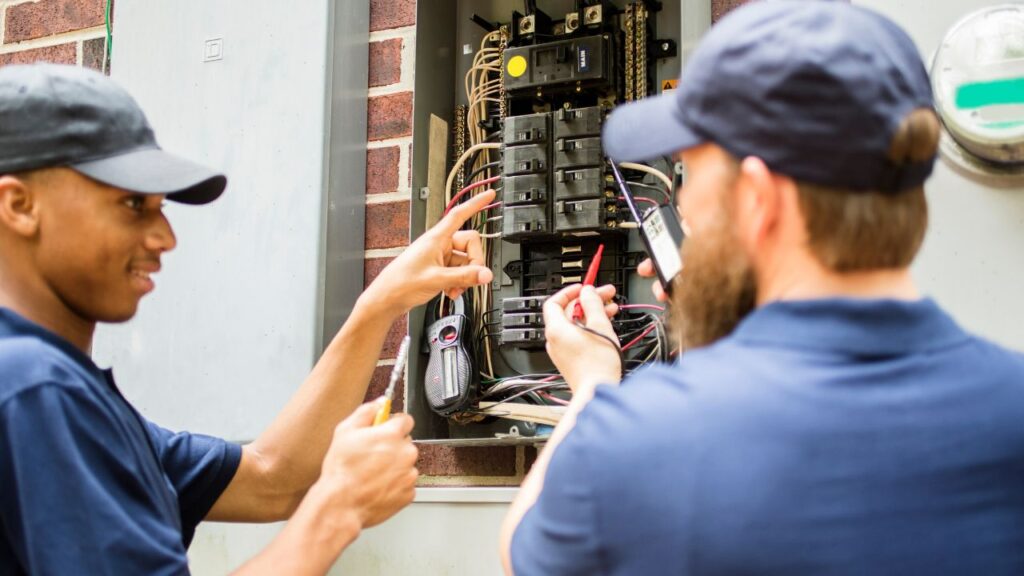When you’re planning a home improvement project involving electrical work, or you’re faced with an unexpected electrical repair, one of the first questions that pops up is, “”How much is this going to cost me?”” This is a common concern, and rightly so. We all want to make sure we’re getting value for our hard-earned money. So, what does it cost to hire an electrician in 2025? Let’s break down the elements that factor into the cost.
The Hourly Rates For Electricians
The hourly rate for an electrician can vary widely, depending on their level of expertise and where you live. As a general rule, you can expect to pay anywhere from $40 to $130 per hour for their services.
Newly minted electricians, known as apprentices, usually charge between $40 and $70 per hour. As they gain experience and become journeyman electricians, their rates increase to between $50 and $100 per hour. Master electricians, with their extensive experience and advanced skills, command the highest rates, typically charging between $90 and $130 per hour.
Then we have commercial electricians, who specialize in electrical systems in commercial buildings. Their rates are slightly higher than residential rates, averaging between $95 and $130 per hour.
Service Call Fees: What To Expect?
Most electricians charge a service call fee. This is a flat fee that usually covers the electrician’s travel and setup costs, and the first hour of work. The average service call fee ranges from $100 to $200.
It’s important to note that this service call fee can vary depending on the region and the complexity of the project. So, in some cases, the fee could be as high as $535. If you’re unsure about this, it’s always a good idea to ask the electrician upfront, so you know what to expect.
Average Costs For Common Electrical Projects
The cost of your project will ultimately depend on the nature and complexity of the work involved. For small jobs, like replacing a fixture or repairing an outlet, you can expect to pay between $150 and $600 in total.

On the other hand, larger or more complex jobs, such as rewiring a whole house or carrying out major panel upgrades, could cost you between $2,000 and $10,000. The national average cost for common electrical tasks is around $348, with most homeowners spending between $163 and $536.
Remember, these are just averages. The cost of your project could be higher or lower, depending on various factors. Always ask for a detailed quote before work begins, so you have a clear understanding of what the job will cost.
In the next part of our guide, we’ll delve further into the factors that influence the cost of hiring an electrician, and compare the costs of residential and commercial electricians. We’ll also take a closer look at the impact of emergency services on pricing. Stay tuned!
Factors Influencing Electrician Costs
Determining the cost of hiring an electrician in 2025 isn’t as simple as it might seem. Several factors come into play. Location is one of the most significant. In areas with a higher cost of living, you can expect to pay more for an electrician’s services. For instance, hiring an electrician in New York City is likely to cost more than in a small town in the Midwest.
The electrician’s level of expertise also plays a crucial role in the cost. A master electrician, with years of experience and advanced skills, will generally charge more per hour than an apprentice or journeyman. This is because they are often called upon to handle more complex and demanding jobs that require a high level of knowledge and competence.
The type of work required is another important consideration. Simple tasks, like replacing an outlet or installing a light fixture, will typically be much cheaper than more complex projects, such as rewiring a house or upgrading an electrical panel.
Comparing Costs: Residential vs. Commercial Electricians
When it comes to the cost of electrical work, there is a difference between residential and commercial electricians. Commercial electricians usually charge slightly more than their residential counterparts. This is because commercial projects often involve more complex electrical systems and higher safety standards.
For instance, a commercial electrician might need to install or maintain large-scale lighting systems, high-voltage equipment, or complex electrical circuits. These tasks require a special set of skills and knowledge, which is reflected in the higher hourly rates.
However, keep in mind that just because commercial electricians charge more per hour doesn’t necessarily mean that the total cost of a commercial project will be higher. The final bill will depend on the nature and complexity of the work involved.
Emergency Services & Their Impact On Pricing
We’ve all been there: a power outage in the middle of the night, a sparking outlet, or a malfunctioning appliance that requires immediate attention. In these cases, you’ll likely need to call an emergency electrician.
Emergency electricians are available around the clock, ready to respond to urgent electrical problems at a moment’s notice. However, this convenience comes at a cost. Emergency electricians typically charge more than non-emergency electricians, often implementing a higher hourly rate or a flat fee for emergency call-outs.
It’s also worth noting that the cost of emergency services can increase during weekends, holidays, or outside regular business hours. So, if you find yourself facing an electrical emergency, be prepared for the additional cost.
Despite the higher cost, it’s crucial to address electrical emergencies promptly. Ignoring an electrical issue could lead to more serious problems down the line, such as electrical fires or damage to your home’s electrical system. So, while emergency services may cost more upfront, they could potentially save you a substantial amount of money in the long run.
Additional Fees & Hidden Costs
As you budget for your electrical work, remember that the hourly rate or project quote you receive isn’t always the final cost. Just like any other service, there can be additional fees and hidden costs involved. It’s crucial to be aware of these potential charges so you can plan your budget effectively.
One potential extra fee is known as a trip or call-out fee. This is separate from the service call fee, and it typically ranges between $40 and $100. The trip fee covers the electrician’s time and expenses for traveling to your location. Some electricians might waive this fee if they’re already in your area for another job, but it’s not something you can always count on.
Next, consider the cost of parts and supplies. If your project involves replacing or installing new fixtures, rewiring, or making other changes that require new materials, these costs will be added to your bill. The cost for parts can vary widely, depending on what’s needed for your project.
Lastly, for some projects, you might need to budget for permits and inspections. If you’re doing significant electrical work, such as a major upgrade or a new installation, your local building department might require you to obtain a permit. This comes with its own set of fees. And after the work is done, you might need to pay for an inspection to ensure everything is up to code.
Tips For Saving On Electrician Services
While electrical work can be expensive, there are ways to save money without compromising the quality of the work. Here are a few tips to help you keep your costs down.
First, do your homework. Shop around and get quotes from at least three different electricians. This gives you a good idea of the average cost for your project in your area, and it also gives you some leverage when negotiating prices.
Second, consider bundling your projects. If you have several small electrical tasks that need to be done, it might be more cost-effective to have them all done at once. This way, you’ll only need to pay the service call fee once, and the electrician might offer you a lower hourly rate for a larger job.
Third, ask about discounts. Some electricians offer discounts for new customers, for paying in cash, or for scheduling work during their off-peak hours. It never hurts to ask!
Lastly, be prepared. Before the electrician arrives, make sure the work area is clean and accessible. This can save time, and as we’ve seen, time is money when you’re paying for an electrician.
Conclusion
Budgeting for electrical work involves more than just looking at hourly rates. It’s important to consider all potential costs, including service call fees, parts, permits, and even emergency rates. By understanding these costs and using some smart strategies, you can keep your electrical project within your budget.
Remember, while it’s important to consider cost, you should never compromise on the quality of electrical work. Hiring a qualified, licensed electrician is a smart investment in the safety and value of your home. After all, trying to save a few dollars today could end up costing you much more in the future if the work isn’t done correctly.
In short, take the time to budget correctly, make informed decisions, and hire the best electrician you can afford. It’s worth it!





